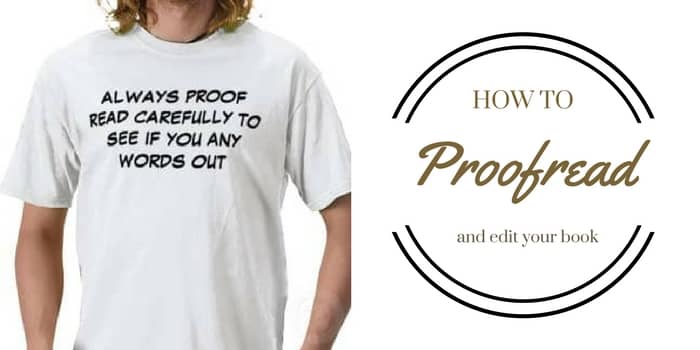
Proofread your book yourself, but take care
Self-publishing may be an inexpensive way to publish a book, but without thorough proofreading and good editing it can turn out to be an embarrassing disaster.
Engaging reliable and professional proofreaders and editors, while a wise move, is far from inexpensive.
Charges range considerably, but at say $0.02 per word for proofreading and $0.03 and upwards for editing, it doesn’t take applied mathematics to discover that for a 100,000-word novel you are looking at a sum in excess of $2,000.
While there is just no escaping the absolute necessity of having an independent pair of eyes, at least, by proofreading your book before publishing, you can save yourself a lot of money and embarrassment by doing some of the work yourself.
However, our brains are programmed in an odd way that can make it difficult to find errors in our own writing. So here are a few ways I have found that work effectively.
This is not to say that you will achieve perfection, but I guarantee you will be very surprised by the number of errors you do find.
Use your tools first
A thorough check with your word processor’s spellchecker is the obvious place to start. Make sure your document is set to your desired form of English.
Analyze each found word carefully and don’t just skip through quickly. Also, look for words around the found words. Mistakes often congregate due to your level of concentration when you were writing.
Then use the inbuilt grammar checker on a separate pass of your document. I particularly like the one installed in Word, but there are many others available.
Check every found error carefully, but also again, look at the whole sentence and make sure all your agreement is correct. As I use a Mac, I also copy my document into Apple’s Pages program as the ‘Proof Reader’ function is very useful as well.
‘Find’ is your friend. The find function in your word processor is the best tool for finding problems in your document.
Think about common errors such as, its and it’s, there, their and they’re, were and where, if and of and well, you know which ones the spellchecker can’t find.
So go hunting. Also, use ‘Find’ for annoying double spaces between words. Another use is to check all of your character’s names. I have often found that I have used the wrong character’s name in a sentence by this method.
Read your book backward. It may sound silly, but your brain concentrates on the story when you read, so proofread out of order. Perhaps last chapter first, or even print out a chapter and mix the pages up. This helps you concentrate on the text only.
A new way I have found is to convert my book, or parts of it, into .mobi format and load it onto my Kindle.
For some reason, errors really stand out when it looks like the finished product. You can use a program called Calibre to convert your Word document to epub or mobi to do this.
I also put a copy on my wife’s Kindle and she always finds more errors. As you can highlight the errors on your Kindle, you can then go back and correct your original manuscript.
The last and I think the most valuable tip is never to try to proofread or edit unless you have had a few weeks break from writing your manuscript. Your head is overloaded at the writing stage, so your brain just does not want to do it. It’s still too much in love with your story to find fault.
Now that you have completed a thorough cleaning up, it’s time to find someone independent to at least proofread for you. Friend, spouse, son, or daughter is fine, but rarely critical enough. But if professional services are too expensive for your project, at least you know you have improved your book.
Then when you are ready to publish, think about reading it just one more time before you hit the button. I bet you’ll find a few more errors and typos that you’ll be so happy you found – that your readers will not.




Also, have a copy of The Elements of Style on hand, it lists common errors. There are many lists on line of editor’s pet peeves, make a list of them – words like that, had, of, just, only, etc. that are overused.
Derek, I agree fully with all of the above. I find that making a pdf file of your WIP gives you a different set of eyes as well. I give up how many times I have found mistooks when reading it as a pdf file. :D
Great tips! I agree that a lot of proofreaders and editors out there are expensive, but there are some of us that focus on affordability for independent authors. No matter whether you pay someone or have someone you trust to look over your manuscript, those other sets of eyes are invaluable for catching errors.
I enjoyed the post!
-Neal
Good advice Derek, thanks. I also find changing the font helps, reading on the screen then reading on paper can also help mistakes show up.
It’s very difficult to get them all though…
Whilst you have mentioned some handy tips, never trust the spellchecker or grammar checker. A spellchecker will check a word is spelled correctly but can’t tell you you’ve the right form of a word. which witch and wych, to too and two being just two examples. Grammar checkers are next to useless It always pays to have some else experienced in proofreading to give selfpublished authors creditibility and present a professional image. Likewise, it also pays to have your book properly edited by someone who knows what they are doing. Proofreading and editing by some professionals is not always expensive. Some charge very reasonable rates and worth every penny of the fee.
Consulting a third party to proof read your book after you have done the editions and review yourself is best. It is good to have your book reviewed by another person as you may have overlooked a few things.
Great advice as always Derek! And obviously we are undercharging if people are getting that much for proofing and copy editing. LOL
I have found that grammar checker really does not help at all, because INTERESTING story telling does not always follow proper grammar rules. Too many wonderful sentences would be found by Grammar check as fragments.
Great advice.
Another neat little trick is to have your computer or Kindle read the manuscript out loud to you. The voice will be robotic, but listening to it can make missing or improperly ordered words obvious.
I have found many proof reading failures with many books and editions of books that should have been perfect by that edition. It really spoils the experience of reading the novel. I would (very unprofessionally) proof read any book for free and I think authors should get a book read by as many people as possible before submitting to iron out errors and allow the author to supervise appropriate changes. As Cee says digital checkers miss out the human image creating.
Similar advice to lots of other folks. I always recommend using a spelling and grammar checker, even though it’s absolutely true that those checkers will miss or misinterpret many things. The trick is, you’re not using the check to change your text; you’re using it as a means for YOU to check your text, evaluating each suggested maybe-mispelling and usage pseudo-error individually. Definitely don’t EVER use a spelling or grammar checker and tell it to “change all”. Evaluate each instance on its own. Arduous? Yes, but that’s what line editing is.
Two things that i also always recommend are proofing on paper and reading the work out loud. I don’t know why, but reading a paper proof will always let you catch things that you’ll gloss over on screen. Always. Reading out loud (ideally from the paper proof) forces your brain to slow down and look at each word, and is especially useful for catching transposition or awkwardness that a mental reading glosses over.
Nice tips! In the process of doing just this and these were very timely and helpful! Sets of eyes are difficult to find, unfortunately, and professionals are unaffordable. But I have one besides my own and I’m gonna have to work with that limitation. Hopefully I can catch most of them!
I’ve been trying the Kindle method you mentioned with my WIP novella. I’m so glad I read this because I seem to have forgotten all about my device’s highlight function! Ha! HIGHLIGHT! Of course, it’s so obvious! :)
Such a timely post. Who among us did NOT catch Susan Andersen’s misfortune this week? Although it was NOT her fault, it could happen to the best of us. Particularly if our work isn’t third-party edited by a human bean.